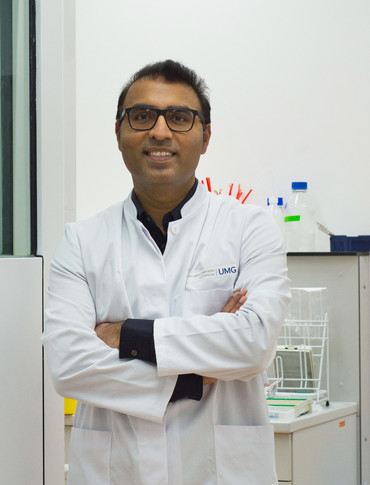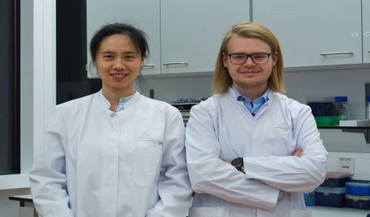Novel findings of KFO5002-researchers: the tumor-stroma determines PDAC subtype identity and impacts subtype-dependent therapy decision making

By Shiv Singh und Elisabeth Heßmann
Of the two well-known types of PDAC (classical and basal-like), the basal-like has bad clinical outcome and resistance to chemotherapy. How the less aggressive and treatable classical type becomes the deadly basal-like type is a question that scientists are vigorously trying to find out. The Singh group (SP2) is highly interested in disentangling the molecular dialogue between classical and basal-like PDAC subtypes with the immune factors that surround them. It is well known that groups of immune cells, called cytotoxic T cells, are efficient in killing cancer cells. However, another group of immune cells called tumor-associated macrophages can suppress these protective cytotoxic T cells, allowing cancer cells to thrive and spread. Therefore, Singh and colleagues turned their attention to macrophages with the hypothesis that they might be central to acquisition of aggressiveness and drug resistance in PDAC. Indeed, macrophages invading PDAC produce a highly inflammatory molecule, tumor necrosis factor-alpha (TNF-α) which converts the less aggressive classical PDAC subtype to the basal-like type which is associated with a worse prognosis. Interestingly, and as demonstrated in various preclinical PDAC models, including those generated by the KFO5002, tumor cells promote the toxic TNF-α production of macrophages by secreting the chemokine CCL2.
Given, that CCL2 was highly abundant in BL PDAC subtypes, the Singh lab subsequently performed in-depth molecular studies to reveal the mechanistic background of CCL transcription. These analyses revealed a subtype-specific expression and regulation of transcription factor complexes. The Singh group detected a strong expression of the cJUN/AP1 transcription factor particularly in the basal-like type, while JUNB/AP1 was enriched in classical tumors. Similarly, the binding profiles of cJUN in basal-like and JUNB in classical were remarkably distinct. Importantly, cJUN could be shown to mediate the inflammatory signaling that also involves CCL2. Using techniques that can switch off cJUN, the direct regulation of CCL2 by cJUN was confirmed. Crucially, exogenous treatment or overexpression of TNF-α in the tumor cells also induced the cJUN-CCL2 axis.

The next step was to try to disrupt this signaling axis to promote the low-grade, differentiated classical phenotype. Unfortunately, inhibition of the transcription factor activity of cJUN is difficult, and treatment with anti-TNF-α antibodies failed in animal models. Thus, we looked for druggable transcriptional co-regulators that are involved in maintaining this TNF-α-cJUN-CCL2 pro basal-like axis. Among BL-specific active transcriptional regions, we found not only cJUN, but also the bromodomain co-regulator BRD4. Due to its involvement in inflammatory gene regulation, we investigated whether BRD4 directly regulates cJUN expression. Indeed, pharmacological inhibition of BRD4 by JQ1 led to a reduction of cJUN as well as CCL2 expression. In addition to highlighting the significance of this newly identified TNF-α-BRD4-cJUN-CCL2-macrophage loop for PDAC patient survival, the Singh group performed pre-clinical treatment studies and demonstrated that BRD4 inhibition in basal-like tumor subtypes raised a real possibility of stopping cytokine secretion, reducing macrophage recruitment, improving tumor differentiation and, finally, prolonging survival. Taken together, the work of the Singh lab revealed that the tumor cells of the BL subtype can secrete factors to recruit pro-tumorigenic macrophages, which supply the tumor cells with TNF-α to foster an aggressive PDAC phenotype.
The work of the Singh group emphasizes the relevance of subtype-driven alterations of genome dynamics for therapy-decision making in PDAC. The article related to this highly important translational work has recently been published in Nature Cancer and was referred to in Cancer Discovery.
Reference (members of the KFO5002 are highlighted in bold):
TNF-α-producing Macrophages Determine Subtype Identity and Prognosis via AP1 Enhancer Reprogramming in Pancreatic Cancer.Mengyu Tu, Lukas Klein, Elisa Espinet, Theodoros Georgomanolis, Florian Wegwitz, Xiaojuan Li, Laura Urbach, Adi Danieli-Mackay, Stefan Küffer, Kamil Bojarczuk, Athanasia Mizi, Ufuk Günesdogan, Björn Chapuy, Zuguang Gu, Albrecht Neesse, Uday Kishore, Philipp Ströbel, Elisabeth Hessmann, Stephan A. Hahn, Andreas Trumpp, Argyris Papantonis, Volker Ellenrieder and Shiv K. Singh. Nature Cancer2021; 2 (11):5540-5554.doi: 10.1038/s43018-021-00258-w.
You may also be interested in